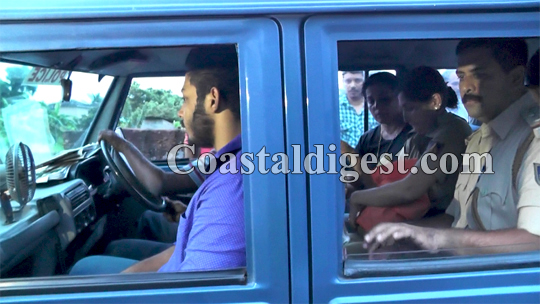Udupi, Aug 12: The emergence of two eyebrow-raising videos that show how the investigation officer accorded a royal treatment' to the two main accused in NRI businessman Bhaskar Shetty murder case has damaged the credibility of Udupi police.

The first video footage clearly shows that Manipal Inspector of Police S.V. Girish, who was the Investigation Officer in this mysterious case, treated the two prime accused in the murder- Rajeshwari Shetty and Navneeth Shetty-with great respect.
The video shows that the inspector allowed Navneeth to sit in the front seat of the jeep, where the former had to sit.
As soon as this video started going viral on social and Udupi district in-charge minister Pramod Madhwaraj brought the matter to the notice of State home minister, the inspector was shifted out of the probe team and Assistant Superintendent of Police, D P Sumana was appointed as the Investigation Officer.
Taken to restaurant
Meanwhile, another controversial CCTV footage has surfaced wherein cops take Rajeshwari and Navneeth to a bar-attached restaurant in Nitte and allow them to take rest there.
Though this incident took place a couple of days ago when the duo was taken to Nanadalike village for crime spot investigation, the video was leaked on Friday.
Meanwhile, Mr Madhwaraj has written to Home Minister G. Parameshwara, urging him to hand over the case to the Criminal Investigation Department (CID).
DNA report awaited
52-year-old Bhaskar Shetty, who owned business establishments in Udupi and Saudi Arabia, went missing from his house here on July 28. His mother, Gulabi Shetty, lodged a missing complaint in the Manipal police station on July 29.
While several rumours were doing the rounds, things took a dramatic turn when Bhaskar Shetty's relative, Joggu Shetty, said he strongly suspected the businessman's wife Rajeshwari (46), their son Navneet (24) and a priest Niranjan Bhat (25) to be involved in the case. On August 7, the police arrested Rajeshwari and Navneet on the charge of murdering Bhaskar Shetty and destroying evidence.
While they arrested Niranjan in Nitte on August 8, he attempted suicide by consuming his diamond ring and a pair of earrings. He is at Kasturba Hospital in Manipal.
On August 10, the police arrested Srinivas Bhat (55), Niranjan's father, and Raghava (35), Niranjan's driver, at Nandalike on the charge of destruction of evidence.
Meanwhile, the police have taken samples from the yagna kund' in Niranjan's house where Bhat allegedly burnt the dead body of Bhaskar Shetty. They have also recovered a few bones from the rivulet at Palli, which have been sent for DNA test.
Also Read:
Udupi: Weak FIR in Bhaskar Shetty murder case intends to protect accused?
Saudi bizman murder: Udupi cops recover bones; 2 more arrested
SIT to probe Saudi businessman Shetty murder case?
Saudi bizman Shetty murder: Will Udupi BJP chief defend notorious trio?
Saudi bizman murder: Bhat swallows diamond ring to avoid arrest
Saudi bizman Bhaskar Shetty murdered by wife, son in Udupi with priest's help
Days after assault by wife and son, Udupi hotelier Bhaskar Shetty goes missing





Comments
Meraa bharat maahaan..
May be these killers will be allowed to host the indian flag in Udupi police station.....ha ha...
Naren and Viren will give speech also..
Add new comment